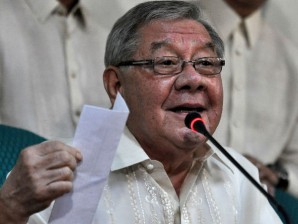Congress to pass higher tax on mines
The House of Representatives will approve a measure to increase the government’s share from mining revenues in support of Malacañang’s move to revitalize the mining industry, Speaker Feliciano Belmonte said Tuesday.
“We will certainly be supportive of whatever is needed,” Belmonte said when asked about the response of the House of Representatives to Malacañang’s call for a law that will increase from 2 percent the excise tax imposed on mining companies,” Belmonte said.
President Benigno Aquino approved to put in place wide-ranging reforms in the mining industry under Executive Order No. 79, which was issued on Monday to strengthen environmental protection, promote responsible mining and provide a more equitable revenue-sharing scheme.
Executive Secretary Paquito Ochoa Jr. said the EO would seek to harmonize mining policies and regulations in the country and make players in the mining industry more transparent and accountable.
It also imposes a 5-percent royalty on new extractions in areas declared as mineral reservations.
Article continues after this advertisementThe EO was based on the joint resolution of the Cabinet clusters on climate change adaptation and mitigation, and economic development dated March 16, 2012.
Article continues after this advertisementThe resolution was aimed at improving environmental mining standards and increasing revenues to promote sustainable development and social growth, both at the national and local levels.
Belmonte said the chamber could pass a new tax bill or incorporate it to the pending bills on mining at the committee level.
An Alternative Minerals Management Bill in the House seeks a 10-percent excise tax and another 10 percent royalty for indigenous peoples to be affected by mining operations.
“If Malacañang wants 5 to 7 percent, then we can discuss this in the committee deliberations, but in our proposal, the royalty for the indigenous peoples communities is separate,” said Ifugao Representative Teodoro Baguilat Jr.
At present, the government collects a royalty of 5 percent of the gross revenues from 11 of the 33 operating mines within the so-called mineral reservation sites.
To increase its share of mining revenue, Manila wants all 33 mines and future projects to be covered by a royalty of 5-7 percent on top of an existing excise tax of 2 percent.
However, the International Monetary Fund has recommended that the Philippines merge its 2-percent excise tax and the 5-percent royalty into one 7-percent royalty, Finance Undersecretary Jun Paul said.
“We need to be competitive against the rest of the world, but at the same time we need to get a fair share of mining revenues, considering the environmental concerns involved,” Paul told Reuters.
New committee
Under the new mining policy, a committee co-chaired by the finance secretary is tasked with coming up with a proposal within two months on mining sector reforms, including mining revenues.
While Environment Secretary Ramon Paje has said the government wants to impose a 5-7 percent royalty on top of a 2-percent excise tax on all mining projects, Paul said this would have to be discussed further by the committee.
The committee will also take up the IMF’s recommendation as well as the bill filed by Senator Ralph Recto last year to increase the excise tax to 7 percent from 2 percent to raise P3.3 billion in additional revenue annually.
Recto proposed that an excise tax be collected from mining firms because they were paid the minute extraction was done, while royalties were paid only after income came from the extraction of minerals.
Baguilat said the demand for paying royalty to the indigenous peoples’ communities was aired during consultations in the House in line with the provisions of Republic Act No. 8371 or the Indigenous People’s Rights Act.
The law seeks to give just and fair compensation to communities affected by any development project, he said.
Biggest winners
A mining executive on Tuesday said owners of the 33 mineral exploration contracts were the biggest winners in the EO, which imposed a ban on new mining deals pending the legislation of a revenue-sharing scheme.
“Their contracts are as good as gold because we don’t see any new contract will be signed under this administration with Congress miles away from amending the new mining law,” said Patrick Caoile, treasurer of the Philippine Mine Safety and Environment Association.
Biggest loser
Congress has at least five, conflicting versions of what it wants to amend in the Mining Act so that it is “inconceivable” for lawmakers to cobble up a unified version before next year’s elections, Caoile said.
Caoile said the biggest loser from the EO was the $5.9-billion Tampakan project of Glencore-Xstrata in South Cotabato.
He said the project was virtually in limbo, with Glencore-Xstrata at a crossroads on what it would do with Southeast Asia’s largest undeveloped copper-gold project.
Paje said no new mining contract would be signed until Congress approved a new revenue-sharing scheme.
“Foreign investors are aghast at how this government could do this to the world’s third largest mining firm and change the rules in the middle of the game especially in a business which requires long-term planning and capital” Caoile said.
He said the government was eager to please every sector with the new EO that it ended up not pleasing anybody.
